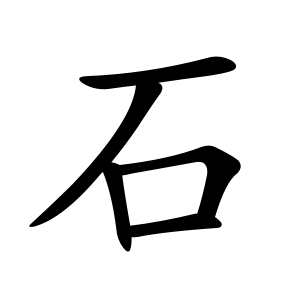石
- stone, rock;
Etymology
Usage in Korean
The radical form of 石 (stone) can appear as a side radical (변) or a bottom radical (발).
As a radical meaning "stone," it frequently appears in characters related to stones, actions involving stones, or qualities like hardness.
Examples include:
砲 (포, cannon/gunpowder)
岩 (암, rock)
硅 (규, silicon)
破 (파, to break)
碑 (비, monument stone)
磨 (마, to grind)
硏 (연, to sharpen)
硝 (초, nitrate)
硫 (류, sulfur)
磁 (자, magnet)
碧 (벽, blue/green jade)
礎 (초, foundation stone)
硬 (경, hard)
確 (확, certain)
碎 (쇄, to crush)
and many more
These characters are all associated with stone or stone-like qualities
Characters with 石
9 strokes
10 strokes
12 strokes
13 strokes
14 strokes
15 strokes
18 strokes
石
돌
석
dol
seok
Kangxi radical:112
Strokes:5
Unicode:U+77F3
Cangjie input:
- 一口 (MR)
Composition:
- ⿸ 丆 口
